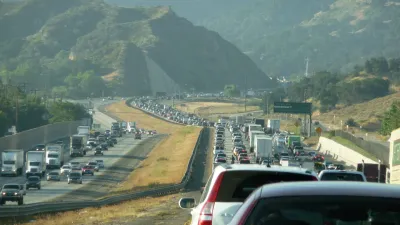As we inexorably approach the day the Highway Trust Fund goes broke, more policy experts offer creative alternatives to the per gallon gasoline tax. Michael Webber of the Energy Institute at UT Austin describes his option in a New York Times op-ed.

Webber, an associate professor of mechanical engineering and deputy director of the Energy Institute at the University of Texas at Austin, suggests that marrying the weight of the vehicle with the distance it travels makes more sense than attempting to increase the 18.4-cent gas tax, unchanged since 1993.
A better option is a “ton mile” fee based on how far vehicles travel and how heavy they are, so that all drivers pay their fair share to fix the resulting road damage. A one-ton car (which is typical for a compact car) that is driven 7,500 miles annually inflicts much less road damage than a two-ton truck that is driven 15,000 miles. While the gas tax captures some of that difference, as the truck driver would buy more fuel, it is not perfectly aligned.
As for the problems associated with vehicle-miles-traveled fees, he proposes a low-tech alternative:
(R)ather than using tracking devices, the fee could be assessed during an annual sticker renewal or inspection that is conducted at state level: All the inspector has to do is read the odometer, look up the gross vehicle weight of the car’s make and model, then assess the fee. With a fee on the order of two cents per ton mile, gas and diesel taxes could be eliminated entirely.
The advantages of the ton-mile-fee is that it encourages lighter vehicles (less wear on the roadway), reduced driving (fewer emissions) while ensuring that all vehicles, including the battery electrics like Tesla, pay their fair share.
Should Congress not act, be it on Webber's proposal or a straight-forward increase of the gas tax such as the bill proposed by Rep. Earl Blumenauer (D-Ore) on Dec 3, 2013, Webber reminds us that by "2015, the highway fund is expected to spend more than $53 billion while collecting less than $39 billion, leaving a shortfall that Congress will be forced to make up."
FULL STORY: How to Overhaul the Gas Tax

Analysis: Cybertruck Fatality Rate Far Exceeds That of Ford Pinto
The Tesla Cybertruck was recalled seven times last year.

National Parks Layoffs Will Cause Communities to Lose Billions
Thousands of essential park workers were laid off this week, just before the busy spring break season.

Retro-silient?: America’s First “Eco-burb,” The Woodlands Turns 50
A master-planned community north of Houston offers lessons on green infrastructure and resilient design, but falls short of its founder’s lofty affordability and walkability goals.

Test News Post 1
This is a summary

Analysis: Cybertruck Fatality Rate Far Exceeds That of Ford Pinto
The Tesla Cybertruck was recalled seven times last year.

Test News Headline 46
Test for the image on the front page.
Urban Design for Planners 1: Software Tools
This six-course series explores essential urban design concepts using open source software and equips planners with the tools they need to participate fully in the urban design process.
Planning for Universal Design
Learn the tools for implementing Universal Design in planning regulations.
EMC Planning Group, Inc.
Planetizen
Planetizen
Mpact (formerly Rail~Volution)
Great Falls Development Authority, Inc.
HUDs Office of Policy Development and Research
NYU Wagner Graduate School of Public Service

























